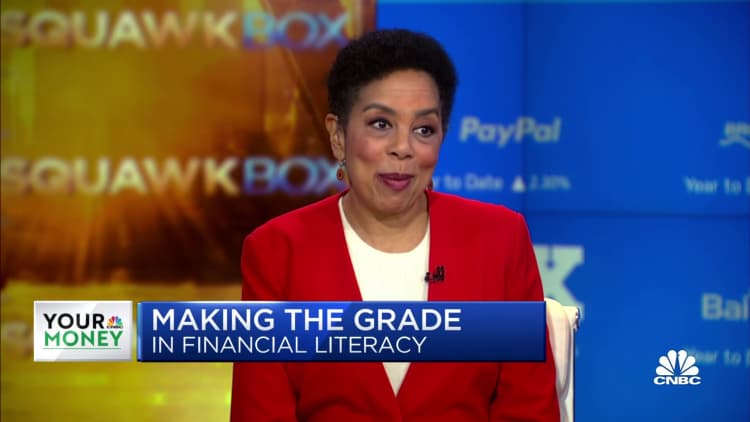
High schools have been buzzing about financial education.
The latest “report card” from the Center for Financial Literacy at Champlain College in Burlington, Vermont, shows seven states — Alabama, Iowa, Mississippi, Missouri, Tennessee, Utah and Virginia — made the top grade. They earned an “A” because in those states, high school graduates in the class of 2023 were required to have taken a personal finance course before graduation.
By 2028, when new laws and policy changes are fully implemented, 23 states are projected to earn an “A,” according to the report.
‘Not a day will go by that you don’t think about money’
In the next five years, more than 4 out of 10 high school students in the U.S. will be enrolled in high schools where a personal finance course will be required before graduating.
They will be learning lifelong lessons.
“Once you graduate from high school, not a day will go by that you don’t think about money, how to make it, how to spend it, how to save it. You will be thinking about this until the day you die,” said John Pelletier, director of Champlain College’s Center for Financial Literacy.
Although some schools and school districts have mandated students receive financial education, experts say the recent increase in the number of states that now guarantee high school students will take a financial literacy course before they graduate is partly due to the Covid-19 pandemic, which underscored the financial fragility of many Americans.
“If you leave it up to local control, the districts most likely to unilaterally do this locally, they’re white, and they’re rich. So you would argue the folks that need it the most are the least likely to get it unless the state requires everyone gets it,” Pelletier said.
Studies show personal finance education can make a significant difference in young adults’ financial behaviors, from improving credit scores and lowering loan delinquency rates to reducing payday lending and helping students make better decisions about college loans.
A few states still have ‘virtually no requirements’
Meanwhile, four states — California, Connecticut, Massachusetts and South Dakota — as well as Washington, D.C., got failing grades, receiving “F”s in this report because they have “virtually no requirements” for personal finance education in high school. Still, advocates in “failing” states, such as California, are working to change the laws to ensure students are guaranteed financial education.

“We are currently collecting signatures in support of financial education for all high schoolers,” said California resident Tim Ranzetta, co-founder of Next Gen Personal Finance, a financial literacy advocacy organization. “We are far outpacing our estimates, demonstrating what we all inherently know: that personal finance is an impactful and easy-to-implement course with strong demand from both students, parents and the general public.”
The momentum for guaranteeing students receive personal finance education is gaining steam in other states, too.
Wisconsin could soon become the 24th state on track to earn an “A” grade from the Center for Financial Literacy. This week, the governor of Wisconsin is expected to take action on a bill requiring a personal financial literacy course for high school graduation.
TUNE IN: The “Cities of Success” special featuring Nashville will air on CNBC on Dec. 6 at 10 p.m. ET/PT.
 EU News Digest Latest News & Updates
EU News Digest Latest News & Updates



